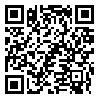Volume 15, Issue 1 (Paramedical Sciences and Military Health (Spring 2020) 2020)
Paramedical Sciences and Military Health 2020, 15(1): 10-17 |
Back to browse issues page
Download citation:
BibTeX | RIS | EndNote | Medlars | ProCite | Reference Manager | RefWorks
Send citation to:



BibTeX | RIS | EndNote | Medlars | ProCite | Reference Manager | RefWorks
Send citation to:
abedi S, roshandel hesari A, abbasi M. Investigating the Relationship Between Self-Efficacy and
Athletic Satisfaction with Soldiers Sport Performance Level. Paramedical Sciences and Military Health 2020; 15 (1) :10-17
URL: http://jps.ajaums.ac.ir/article-1-209-en.html
URL: http://jps.ajaums.ac.ir/article-1-209-en.html
1- Department of jurisprudence and Principles of Islamic Law, Faculty of Theology and Islamic Studies, Islamic Azad University of shirvan, North Khorasan ,Iran , Abedisadeh69@gmail.com
2- Department of Sport Pathology and Corrective Exercises, Faculty of Physical Education and Sport Sciences, Islamic Azad University of Isfahan, Isfahan, Iran
3- Department of Sport Management, Faculty of Physical Education and Sport Sciences, Islamic Azad University of Shirvan, North Khorasan, Iran.
2- Department of Sport Pathology and Corrective Exercises, Faculty of Physical Education and Sport Sciences, Islamic Azad University of Isfahan, Isfahan, Iran
3- Department of Sport Management, Faculty of Physical Education and Sport Sciences, Islamic Azad University of Shirvan, North Khorasan, Iran.
Abstract: (4243 Views)
Introduction: The present study aimed to investigate the relationship between self-efficacy and athletic satisfaction with the sport performance level in soldiers.
Methods and Materials: This research is a correlational study and its statistical population was all soldiers aged 18 to 30 years of the 130 presidio Brigade of the Martyrs of Deljuyan in Bojnourd in 2019. 258 people were selected by cluster random sampling technique. The Athlete Satisfaction Questionnaire (ASQ), the Sovereign Self-Efficacy Questionnaire (GSES) and the Sports Performance Checklist were used to collect research data. Spirman correlation coefficient statistical methods, step-by-step regression analysis and Collis-Wallis test were used to analyze the research data through SPSS version 22.
Results:The results showed that there was a positive correlation between sports satisfaction and athletic performance (P <0.01). There is a positive correlation between self-efficacy (effort, initiative, perseverance) and athletic performance (P <0.01). The variables of initiative, perseverance and sports satisfaction are able to positively predict 28% of the variance in soldiers' athletic performance (P <0.001). There is no statistically significant relationship between the age and level of soldiers education with athletic performance, athletic satisfaction and self-efficacy (P <0.05). There is also no statistically significant relationship between athletic background and athletic satisfaction; however soldiers athletic performance and their self efficacy enhance by increasing their athletic background (P <0.05).
Discussion and Conclusion: Based on the findings of the present study, it can be concluded that sports satisfaction and self-efficacy can predict soldier’s athletic performance.
Methods and Materials: This research is a correlational study and its statistical population was all soldiers aged 18 to 30 years of the 130 presidio Brigade of the Martyrs of Deljuyan in Bojnourd in 2019. 258 people were selected by cluster random sampling technique. The Athlete Satisfaction Questionnaire (ASQ), the Sovereign Self-Efficacy Questionnaire (GSES) and the Sports Performance Checklist were used to collect research data. Spirman correlation coefficient statistical methods, step-by-step regression analysis and Collis-Wallis test were used to analyze the research data through SPSS version 22.
Results:The results showed that there was a positive correlation between sports satisfaction and athletic performance (P <0.01). There is a positive correlation between self-efficacy (effort, initiative, perseverance) and athletic performance (P <0.01). The variables of initiative, perseverance and sports satisfaction are able to positively predict 28% of the variance in soldiers' athletic performance (P <0.001). There is no statistically significant relationship between the age and level of soldiers education with athletic performance, athletic satisfaction and self-efficacy (P <0.05). There is also no statistically significant relationship between athletic background and athletic satisfaction; however soldiers athletic performance and their self efficacy enhance by increasing their athletic background (P <0.05).
Discussion and Conclusion: Based on the findings of the present study, it can be concluded that sports satisfaction and self-efficacy can predict soldier’s athletic performance.
Type of Study: Research |
Subject:
full articles
Received: 2020/05/2 | Accepted: 2020/09/24 | Published: 2020/02/20
Received: 2020/05/2 | Accepted: 2020/09/24 | Published: 2020/02/20
Send email to the article author
| Rights and permissions | |
 |
This work is licensed under a Creative Commons Attribution-NonCommercial 4.0 International License. |




